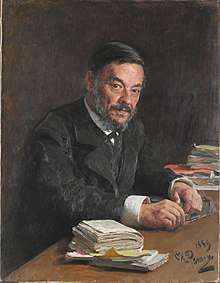Ivan Sechenov
Ivan Mikhaylovich Sechenov (Russian: Ива́н Миха́йлович Се́ченов; August 13 [O.S. August 1] 1829, Tyoply Stan (now Sechenovo) near Simbirsk, Russia – November 15 [O.S. November 2] 1905,[1] Moscow), was a Russian physiologist. Ivan Pavlov referred to him as the "Father of Russian physiology and scientific psychology". Sechenov is also considered one of the originators of objective psychology.[2]

Sechenov authored the classic, Reflexes of the Brain, introducing electrophysiology and neurophysiology into laboratories and teaching of medicine.
Biography
Sechenov was born in the village of Tepli Stan, which is now known as Sechenov, Gorky Oblast.[3] He was a son of a nobleman and a peasant. Sechenov was first taught by private tutors and he had mastered German and French at an early age.[4] By the age of 14, he was admitted to the St. Petersburg Military Engineering School.[4] After his military training, he became interested with medicine so he studied medicine at Moscow University, completing an M.D. degree in 1856.[5] He received the best of Russian education both in basic and clinical sciences.[3] He then pursued higher medical education abroad[5] and was mentored and influenced by European scientists that included Johannes Müller, Emil DuBois-Reymond, Hermann von Helmholtz, Carl F. W. Ludwig, Robert W. Bunsen, and Heinrich Magnus.[4] Sechenov worked as a professor at the Medical Surgery Academy until 1870.[6]
- 1843-1848 Main Military Engineering School, now Military engineering-technical university (Russian: Военный инженерно-технический университет), in Saint Petersburg
- 1850-1856 studies of medicine at Moscow University
- 1860 M.D. from the Imperial Military Medical Academy of St. Petersburg
- 1860-1870 professor at the Imperial Military Medical Academy. Foundation of the first Russian school of physiology. Sechenov resigned to protest the rejection of Ilya Ilyich Mechnikov (the founder of immunology, the Nobel Prize laureate of 1908)[7]
- 1870 chemical research in Mendeleev's laboratory in St. Petersburg
- 1871-1876 chair at the Novorossiysk University at Odessa (where Mechnikov had been appointed Titular Professor of Zoology and Comparative Anatomy)
- 1876-1888 professor at St. Petersburg University
- 1889 "Sechenov's equation" is introduced (from experimental evidence) for solubility of gases
- 1891-1901 professor at Moscow University
- 1904 elected honorary member of Russian Academy of Sciences
Sechenov's major interest was neurophysiology (the structure of the brain). He showed that brain activity is linked to electric currents and developed an interest in electrophysiology. Among his discoveries was the cerebral inhibition of spinal reflexes. He also maintained that chemical factors in the environment of the cell are of great importance.
From 1856–1862 Sechenov studied and worked in Europe in laboratories of Mueller, du Bois-Reymond, von Helmholtz (Berlin), Felix Hoppe-Seyler (Leipzig), Ludwig (Vienna), and Claude Bernard (Paris).
Like several other Russian scientists of the period Sechenov was often in conflict with the tsarist government and conservative colleagues, but he did not emigrate. In 1866, the censorship committee in St. Petersburg attempted judicial procedures accusing Sechenov of spreading materialism and of "debasing of Christian morality".
Impact
Sechenov's work laid the foundations for the study of reflexes, animal and human behaviour, and neuroscience. He was an influence on Vladimir Bekhterev and Vladimir Nikolayevich Myasishchev when they set up the Institute of Brain and Psychic Activity in 1918.
Selected works
- 1860 Materialy dlya buduschey fiziologii alkogolnogo opyanenia. St. Petersburg ("Some facts for the future study of alcohol intoxication", in Russian)
- 1862 O zhivotnom elektrichestve. St. Petersburg ("On animal electricity", in Russian)
- 1863 "Refleksy golovnogo mozga." Meditsinsky vestnik 47-48 ("Reflexes of the brain", in Russian)
- 1866 Fiziologia nervnoy sistemy. St. Petersburg ("Physiology of the nervous system", in Russian)
- 1873 "Komu i kak razrabatyvat psikhologiyu." Vestnik Evropy 4 ("Who should and How to develop Psychology", in Russian)
- 1897 The Physiological Criteria of the Length of the Working Day
- 1900 Participation of the Nervous System in Man's Working Movements
- 1901 Participation of the Senses and Manual dexterity in Sighted and Blind Persons
- 1901 Essay on Man's Working Movements
Commemoration
- 1954 the area around Sechenov's birthplace was renamed Sechenovsky District of Nizhny Novgorod Oblast
- 1955 Moscow Medical Academy was given name of I.M.Sechenov; its campus includes memorial of Sechenov
- 1956 Institute of Evolutionary Physiology in Leningrad was reorganized as a part of USSR Academy of Sciences and named after I.M.Sechenov
References
- Ivan Sechenov at the Garant information center
- Learning, Gale, Cengage (2015-03-13). A Study Guide for Psychologists and Their Theories for Students: IVAN PAVLOV. Gale, Cengage Learning. ISBN 9781410333377.
- Haas, L. F. (1998-10-01). "Ivan Mikhailovich Sechenov (1829-1905)". Journal of Neurology, Neurosurgery & Psychiatry. 65 (4): 554–554. doi:10.1136/jnnp.65.4.554. ISSN 0022-3050. PMC 2170266. PMID 9771783.
- "Sechenov, Ivan M. | Encyclopedia.com". www.encyclopedia.com. Retrieved 2019-04-04.
- Lawson, Robert B.; Graham, Jean E.; Baker, Kristin M. (2016). A History of Psychology: Globalization, Ideas, and Applications. New York: Routledge. p. 399. ISBN 9780130141231.
- Saunders, Barbara R. (2006). Ivan Pavlov: Exploring the Mysteries of Behavior. Berkeley Heights, NJ: Enslow Publishers, Inc. pp. 30. ISBN 9780766025066.
- Peter Kropotkin (1901). "The Present Crisis in Russia". The North American Review.
- Zusne, Leonard. 1984. Biographical Dictionary of Psychology. Westport, Connecticut: Greenwood Press. ISBN 0-313-24027-2
- Ivan Sechenov at University of Illinois at Chicago, Department of Neurology
- Ivan Sechenov at Max Planck Institute for History - part of "The Virtual Laboratory, Essays and Resources on the Experimentalization of Life"